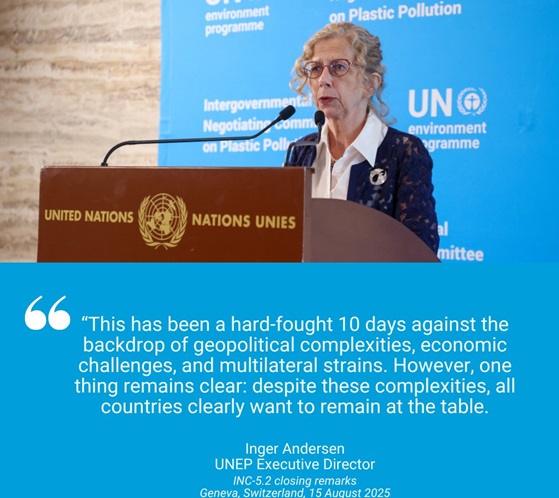No agreement reached on global treaty
It was ten days of intense negotiations, but in the end, no agreement was reached on the treaty text. We’re talking about the fifth session of the Intergovernmental Negotiating Committee (INC-5.2), held in Geneva from 5 to 14 August, aiming to define an international legally binding treaty to tackle plastic pollution. The talks were adjourned early on 15 August, with Member States committing to resume negotiations at a future date still to be announced.
Despite the deep divisions that emerged during discussions, there was a shared willingness to continue the process, which many see as essential in addressing one of the most serious environmental crises of our time.
“Even though we didn’t achieve the text we had hoped for, all countries want to stay at the table,” said Inger Andersen, Executive Director of the United Nations Environment Programme (UNEP).
“We will continue the fight against plastic pollution — pollution that is in the water we drink, in our soil, in our rivers, in our oceans, and yes, in our bodies.”
The meeting brought together over 2,600 participants, including 1,400 government delegates from 183 countries, around 1,000 observers from more than 400 organizations, and 70 ministers or deputy ministers. Numerous informal events and side discussions took place alongside the official plenary sessions.
The session focused on four key areas: plastic design, chemicals of concern, production limits, financing, and compliance mechanisms. The starting point for negotiations was the Chair’s text prepared during the previous session (INC-5.1, held in Busan, South Korea). However, despite several revisions, countries were unable to reach consensus on a shared version of the text.
At the root of the deadlock lie significant differences among countries, especially on critical points such as reducing virgin plastic production, regulating chemical additives, and funding mechanisms for developing countries.
“Failing to reach the goal we set for ourselves can be frustrating, but we must not be discouraged,” said Ambassador Luis Vayas Valdivieso, Chair of the INC.
“It didn’t happen here in Geneva, but I am confident the day will come when the international community unites its will to protect the environment and safeguard people’s health.”
Although the session closed without a formal agreement, the political will to continue working on a binding legal instrument remains strong. The date of the next session will be announced in the coming months.
The international community now waits, hopeful that the next meeting will mark a decisive step toward a global treaty to end plastic pollution.

